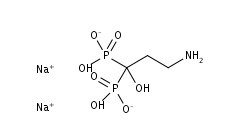Pamidronate Disodium CAS NO 57248-88-1 Inquire about Pamidronate Disodium
Tecoland supplies Pamidronate Disodium bulk active pharmaceutical ingredient (API) to the pharmaceutical industry. Our Pamidronate Disodium is manufactured by cGMP compliant facility. Welcome to contact us for further details including current DMF status for the product and up to date regulatory status of the manufacturing facility. We look forward to assisting you with your research and development projects.
What is Pamidronate?
Pamidronate is in a class of drugs called bisphosphonates. Pamidronate reduces breakdown of the bones. Pamidronate has been approved for treatment of osteolytic bone metastases of breast cancer, in conjunction with standard antineoplastic therapy.
Pamidronate is the first drug that has been proven to reduce the incidence of skeletal complications of metastatic breast cancer, thereby reducing the need for radiation therapy or surgery to the bone. It has also been shown to provide relief of bone pain caused by metastatic breast cancer, thereby reducing the need for narcotic analgesics.
Pamidronate mechanism of action:
Pamidronate is a second-generation bisphosphonate, which inhibits bone resorption. Bisphosphonates are analogues of endogenous pyrophosphate and characterized by a P-C-P bond, which is resistant to enzymatic hydrolysis. The mechanism of action of bisphosphonates has not been fully elucidated.
Pamidronate does not interfere with bone mineralization at therapeutic doses. On a molar basis, pamidronate is 10 times more potent than clodronate. In malignancy-related hypercalcemia, pamidronate decreases serum Calcium by inhibiting tumour-induced bone resorption and reducing Calcium flow from the resorbing bone into the blood. Pamidronate also reduces morbidity of osteolytic bone metastases in breast cancer and multiple myeloma by inhibiting tumour-induced bone resorption.
What should I know about pamidronate?
Do not use pamidronate without first talking to your doctor if you have had an allergic reaction to pamidronate or another similar medication such as alendronate (Fosamax), etidronate (Didronel), risedronate (Actonel), tiludronate (Skelid), or zoledronic acid (Zometa).
Pamidronate is used in the treatment of Paget’s disease of bone; to reduce high levels of Calcium in the blood associated with malignancy (cancer); and to reduce the breakdown of bone due to metastases of breast cancer or multiple myeloma (a type of cancer of the blood).
Pamidronate may also be used for purposes other than those listed in this medication guide.
Other Pamidronate Information
Before using pamidronate, talk to your doctor if you have kidney disease. You may not be able to use pamidronate, or you may require a dosage adjustment or special monitoring during treatment.
A healthcare professional will administer pamidronate by injection into a vein (intravenous infusion). It is not known whether pamidronate passes into breast milk. Do not use pamidronate without first talking to your doctor if you are breast-feeding a baby.
Pamidronate is in the FDA pregnancy category D. This means that it is known to be harmful to an unborn baby. Do not use pamidronate without first talking to your doctor if you are pregnant or could become pregnant during treatment.
How should I use pamidronate?
If you are using pamidronate at home, your healthcare provider will give you detailed instructions regarding preparation, administration, and storage of the medication.
Your doctor may want you to have regularly scheduled blood tests or other medical evaluations during treatment with pamidronate to monitor progress and side effects. Your healthcare provider will store pamidronate as directed by the manufacturer.
What happens if I miss a dose?
Contact your doctor if you miss a dose of pamidronate.
What happens if I overdose?
If an overdose of pamidronate is suspected, seek emergency medical attention or contact your healthcare provider immediately. The symptoms of a pamidronate overdose may include fever and low blood pressure.
What should I avoid while using pamidronate?
There are no restrictions on food, beverages, or activity while using pamidronate unless otherwise directed by your doctor.
What are the possible side effects of pamidronate?
Stop using pamidronate and seek emergency medical attention or contact your doctor immediately if you experience any of the following serious side effects:
an allergic reaction (difficulty breathing; closing of the throat; swelling of the lips, tongue, or face; or hives)
Other, less serious side effects may be more likely to occur. Continue to use pamidronate and talk to your doctor if you experience
What other drugs will affect pamidronate?
Other medicines that affect the kidneys may increase the risk of damage to the kidneys if used during treatment with pamidronate. Talk to your doctor and pharmacist before taking any prescription or over-the-counter medicines, including vitamins, minerals, and herbal products during treatment with pamidronate.
Where can I get more pamidronate information?
Your pharmacist has more information about pamidronate written for health professionals that you may read.
Disclaimer:
Information on this page is provided for general information purposes. You should not make a clinical treatment decision based on information contained in this page without consulting other references including the package insert of the drug, textbooks and where relevant, expert opinion. We cannot be held responsible for any errors you make in administering drugs mentioned on this page, nor for use of any erroneous information contained on this page.